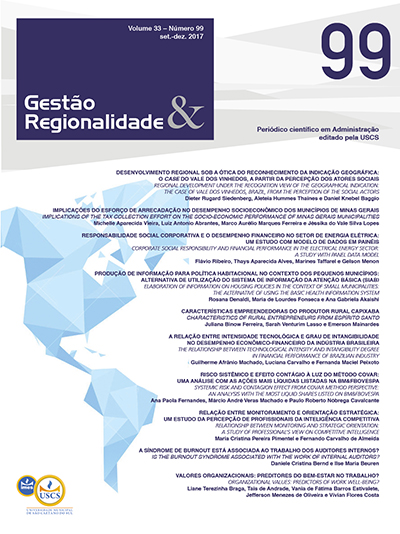THE RELATIONSHIP BETWEEN TECHNOLOGICAL INTENSITY AND INTANGIBILITY DEGREE IN FINANCIAL PERFORMANCE OF BRAZILIAN INDUSTRY
DOI:
https://doi.org/10.13037/gr.vol33n99.4167Abstract
This study aimed to verify the influence of technological intensity in the relationship between the intangibility degree and economic-financial performance in the Brazilian industry. Therefore, we used the classification of Organization for Economic Cooperation and Development (OECD). The sample involved Brazilian companies listed on the BM&FBovespa from 2011 to 2015. The statistical technique relied on panel data with fixed and random effects, as Hausman test. Regarding the variables, to translate the intangible dimension of organizations, intangibility degree was used as the dependent variable, while return on assets (ROA), return on equity (ROE) and return were used as independent variables representing economic-financial performance. The results revealed that there is no significant difference in the intangibility-performance ratio among sectors with high and medium-high technological intensity and low and medium-low technology. Furthermore, it was observed that the Intangibility degree does not exert significant influence on indicators such as ROA, ROE, and Return for the sample and period investigated.
Downloads
Downloads
Published
How to Cite
Issue
Section
License
Copyright (c) 2017 Guilherme Afrânio Machado, Luciana Carvalho, Fernanda Maciel Peixoto (Autor)

This work is licensed under a Creative Commons Attribution-NonCommercial-NoDerivatives 4.0 International License.
Autores que publicam nesta revista concordam com os seguintes termos:
- Autores mantém os direitos autorais e concedem à revista o direito de primeira publicação, com o trabalho simultaneamente licenciado sob a https://creativecommons.org/
licenses/by-nc-nd/4.0/ , permitindo o compartilhamento do trabalho com reconhecimento da autoria do trabalho e publicação inicial nesta revista. - Autores têm autorização para assumir contratos adicionais separadamente, para distribuição não-exclusiva da versão do trabalho publicada nesta revista (ex.: publicar em repositório institucional ou como capítulo de livro), com reconhecimento de autoria e publicação inicial nesta revista.
- Autores têm permissão e são estimulados a publicar e distribuir seu trabalho online (ex.: em repositórios institucionais ou na sua página pessoal) a qualquer ponto antes ou durante o processo editorial, já que isso pode gerar alterações produtivas, bem como aumentar o impacto e a citação do trabalho publicado (Veja O Efeito do Acesso Livre).
























